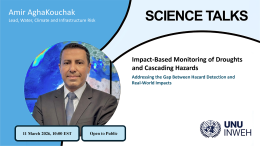This session at the UNESCO World Higher Education Conference 2022 in Barcelona will explore the role of higher education in climate action, with a focus on how to empower young leaders and build national capacity. It will discuss the knowledge and skills needed to implement the Paris Agreement on climate change — the international commitment to limit global warming to well below 2°C and strive for 1.5°C.
The roundtable session will share progress by UNU-IAS in developing a new postgraduate degree specialisation on the Paris Agreement, which was announced at COP26 in November 2021. It will be implemented in close collaboration with development partners, governments, and leading universities. This roundtable discussion will gather inputs from stakeholders and partners to inform the development of the initiative, ensuring its relevance to national capacity needs and skills gaps for implementing the Paris Agreement. The session will develop collaboration and partnerships for delivering the specialisation, which is to be launched in Autumn 2023.
Participants will also exchange innovative practices and perspectives on education for sustainable development (ESD) and further elaborate the roles of education and empowerment for climate action and the sustainability transformation.
Participation
The event will be held in Barcelona, Spain, and is open to conference participants. It will be held in Fira Room 8.
Programme
Opening Remarks
- Shinobu Yume Yamaguchi (Director, UNU-IAS)
Segment 1
Project overview
- Akio Takemoto (Programme Head, UNU-IAS)
Responses from panelists
Moderator: Philip Vaughter (Consultant, UNU-IAS)
Panelists:
- Won Jung Byun (Programme Specialist, Section of Education for Sustainable Development, UNESCO)
- Kanako Morita (Senior Researcher, Center for Biodiversity and Climate Change, Forestry and Forest Products Research Institute)
- Atsushi Sato (Chief Analyst, Mitsubishi UFJ Research and Consulting)
- Laurent Cortese (Deputy Head, Education-Vocational Training-Employment and Higher Education Division, French Agency for Development)
Segment 2
Discussions with panelists
- Discussion 1:
What are the required competencies to implement the Paris Agreement at national level? Who should be the beneficiary learners?
What are the learning activities to support achieving the competencies?
- Discussion 2:
What is the ideal form of partnership to successfully deliver the programme?
Who among the partners can support the identified learning activities?
Wrap up: next steps
- Akio Takemoto (Programme Head, UNU-IAS)



